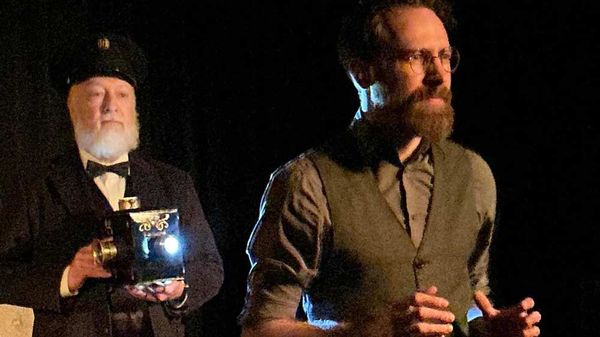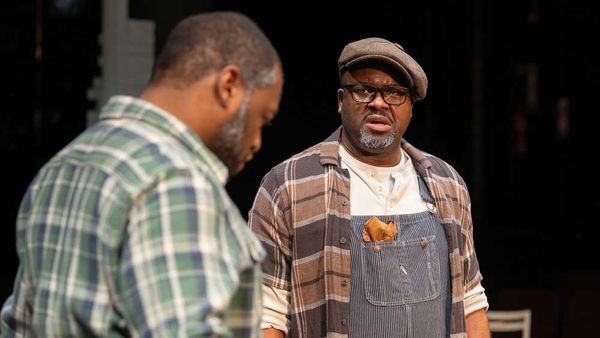
September 14, 2018
Both Sides Now: Live At The Isle Of Wight Festival 1970
Kevin Schattenkirk READ TIME: 3 MIN.
A small island off the coast of England, Isle of Wight began hosting music festivals in 1968. The festival's third installment took place in 1970 and it was the largest, with an estimated crowd of 600-700K.
But the counterculture audience had turned, becoming openly hostile toward the performers. A new documentary, "Both Sides Now: Live at the Isle of Wight Festival 1970," by the late Murray Lerner (who unfortunately passed away after production), looks at Joni Mitchell's set as a sort of case study on how things seemed to go awry only one year after Woodstock. New interviews with Mitchell punctuate beautifully restored footage from the concert.
"It was a 'hate the performer' festival," Mitchell confides early on in the film. The reason? Many of the artists were paid large amounts of money to perform, arriving on site in fancy and expensive vehicles. This only fed into audience frustrations over the festival selling out, both literally and figuratively, and erecting fences to keep out attendees who had not purchased tickets. Common feelings were centered on perceived inequity: The music isn't "free" anymore, the artists are taking all the dough you'll offer up, and hippy integrity was dead. As one angry, ticketless bystander camped up on a hill overlooking the concert, declared, "The music itself isn't revolutionary... it's big business."
Beginning her set, Mitchell strolls out onstage, smiling incredulously, looking out at the massive crowd, playfully stating, "It looks like the making of 'Ben Hur!'" and then launching into her set opener, "That Song About the Midway." But through the first four songs, Mitchell is subjected to hoots, hollers, jeers, and interruptions that visibly take a toll.
Mitchell admits that, as "an acoustic act" performing with just acoustic guitar and piano, the festival was more suited to rock bands like The Who (also part of the 1970 lineup). Consequently, she approached her set "with dread." When the audience becomes more impetuous, Mitchell puts down the guitar and moves to the piano for the third song. As the piano is situated slightly further away from the audience, one can't help but wonder if this was a protective move. In addition to the verbal taunts, one man trips out on acid; shortly after that, another man finds his way onstage to "make an announcement." Both incidents temporarily halt Mitchell's performance. Her distress becomes increasingly evident.
Mitchell attempts to quell her "dread" and politely reign in the unruly audience - smiling and introducing each song, trying to teach the audience the chorus of "Woodstock," gently asking them to "give her a little help" and stop with the distractions. While playing through the opening bars of "My Old Man," Mitchell cannot hide her frustration, stopping the song and ripping into the audience for a few minutes - "Listen a minute, will you?!" - and ending the very-necessary scolding with a demand to "Give us some respect!" Mitchell acknowledges the mixed emotions she felt in that moment - indignation, frustration, and embarrassment for those disrupting the concert - but adds that she could tell the audience softened after her "little speech." And so they did, quickly becoming appreciative, engaged and eventually rapt by her performance. When an encore was requested, Mitchell admits, "I was beaming." That's quite a turnaround in the course of 11 songs.
The documentary also uses new interview footage to pick Mitchell's brain on topics such as "What is music?," the processes of writing songs, the evolution of her untrained musicianship to encompass her interests in jazz, and connecting with the audience. Mitchell explains her feeling that she differs from artists who thrive on applause after every song. In contrast, she would rather have the audience treat her performances "like a play," enjoy the music and applaud at the end if you appreciate her work. Obviously, she was received much differently at the Isle of Wight festival.
The only special feature on the Blu-ray edition is Mitchell's full set from the festival, an impeccably beautiful performance. While the film explores the death of a counterculture movement audiences had so heavily invested in, it is also a testament to why Mitchell is one of the most significant artists to emerge from the 1960s. In the year immediately following this show, Mitchell's aesthetic would dramatically shift with the release of her stunning fourth album "Blue," prompting the musical innovations for which she is most often celebrated.
"Joni Mitchell - Both Sides Now: Live at the Isle of Wight Festival 1970"
Blu-ray
$16.39
http://www.eagle-rock.com/joni-mitchell
Kevin Schattenkirk is an ethnomusicologist and pop music aficionado.







